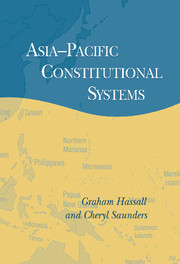Book contents
- Frontmatter
- Contents
- Acknowledgements
- Map: The Asia-Pacific Region
- Introduction
- Part I Modernity and Nation-States at the Dawn of the Global Era
- Part II The Constitution of Modernity
- 4 The legislature
- 5 Representation
- 6 Head of state
- 7 Constitutional revision
- Part III Democracy and the Rule of Law
- Conclusion: Postmodernity and constitutionalism
- Appendix: Chronology of constitutional events in the Asia Pacific
- Bibliography
- Index
5 - Representation
Published online by Cambridge University Press: 09 October 2009
- Frontmatter
- Contents
- Acknowledgements
- Map: The Asia-Pacific Region
- Introduction
- Part I Modernity and Nation-States at the Dawn of the Global Era
- Part II The Constitution of Modernity
- 4 The legislature
- 5 Representation
- 6 Head of state
- 7 Constitutional revision
- Part III Democracy and the Rule of Law
- Conclusion: Postmodernity and constitutionalism
- Appendix: Chronology of constitutional events in the Asia Pacific
- Bibliography
- Index
Summary
Representation functions as an 'intermediary principle' by which democratic systems can be created. Representative government ensures that nobody is in a position to exercise absolute power, and control over their representatives through elections is one way in which the people exercise their political power. The concept of what is represented changes between countries: the representatives of different segments of the population, such as ethnic communities, distinct regions, powerful ideologies, class interests, and economic and resource interests, can be judicially mixed in a successful legislature so as to preserve the viability of the system as a whole. All constitutional systems, regardless of the extent of their democratic nature, include a system of representation. Not all constitutions aim at being democratic, although democracies should be constitutional. Systems of representation, similarly, are not necessarily democratic, whereas a democracy requires a system of representation.
The choosing of representatives through elections is an idea that is new to Asia-Pacific states. Local-level leaders and sovereigns alike were traditionally selected either through lineage, through proven ability, or by the imposition of their leadership on the group. Limited franchise came to Asia-Pacific states during the colonial period. Elections were usually for petty government officials, and franchise restricted to elites co-opted into the colonial system. Where universal franchise was generally introduced at the approach to independence or after, electoral processes manifest a number of deficiencies: lack of monitoring agencies, lack of public awareness and education, and general immaturity in the various components of civil society.
- Type
- Chapter
- Information
- Asia-Pacific Constitutional Systems , pp. 91 - 118Publisher: Cambridge University PressPrint publication year: 2002



